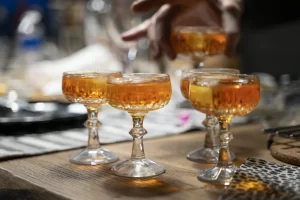Michigan Liquor Laws And Regulations
Liquor laws and regulations vary by state, and Michigan is no exception.
With the recent updates to the Michigan Liquor Control Code of 1998, it is more important than ever to understand the laws and regulations governing the sale, use, and consumption of alcohol in Michigan.
This article will provide an overview of Michigan’s liquor laws and regulations, including information on licensing requirements for Alcoholic Beverages ages, restrictions on advertising and sales, and regulations governing the sale of spirits.
What Does The Law Say About Selling Liquor In The State Of Michigan?
The idea that certain activities involving alcohol are acceptable under the law can often be misguided, as the laws governing alcohol age minimums vary depending on the state.
In Michigan, adults aged 19 and below are restricted from participating in such activities, regardless of religious beliefs.
This includes minors being prohibited from sipping wine at dinner with their parents, communion wine for youth aged 19 and below, or celebrating a newly-wed couple’s union with even a single glass of champagne.
Allowing someone under this age to partake in drinking liquor in any facility will result in a fee or worse for the owner of the establishment.
What Are The State Fees For The State Of Michigan?
The penalties for a first conviction of OWI or OWPD can be quite severe.
In Michigan, an OWI or OWPD conviction carries with it a fine of $100 to $500, jail time of up to 93 days, and 360 hours of community service. Additionally, the consequences of an OWI or OWPD charge include license suspension for six months.
As if that weren’t enough, the state also has the right to immobilize your vehicle and add six points to your driving record once you are convicted.
To make matters worse, you may even be required to install an ignition interlock device in your car if your BAC is .08 or higher.
All of these consequences understandably make even those who plead guilty to an OWI or OWPD feel much less secure about their future prospects behind the wheel.
Not only do they have to endure expensive fines and possibly lose out on being able to drive for a few months, but they also risk losing their vehicle if charged by immobilization or adding extra points against their driving record, as well as having to pay for the installation of an ignition interlock device in their car.
It, therefore, stands that anyone facing such charges should think carefully before deciding how they will proceed.
What Are The Licensing Requirements For The State Of Michigan?
Obtaining a liquor license in the state of Michigan can be quite a lengthy process, but is necessary to legally serve alcohol.
The first step to applying for a license is completing an application checklist which verifies that you have all the necessary information including fingerprints, fees, and meeting with state officials.
Once enrolled in the program, it could take up to several months of processing before you receive your liquor license.
When considering different types of licenses, there are various pricing options depending on what type of alcohol offering you plan on serving your customers.
For restaurants or bars seeking to serve beer, wine, spirits, and mixed drinks for on-premise consumption, they must obtain a Class C License which carries fees associated with it.
Understanding the fees associated with each license should be addressed early in the process, as ignorance can lead to additional costs down the road.
Familiarizing yourself with local regulations is important, as any violations of such regulations can result in fines or temporary suspension of your license altogether.
Regulation Inspections
Inspections conducted by the enforcement staff are done to make sure that any licenses are issued correctly, to investigate complaints, and to make sure that those who have been granted licenses are adhering to all the commission’s codes and rules.
Inspections typically involve an inspection report form with questions related to sanitation in the facility, whether there is signage present as well as access to posters which may be necessary for legal operations.
Enforcement staff can occasionally consist of local law enforcement agencies, making them familiar with any regulations related to their jurisdiction.
It is important to take note of potential code violations as they could result in fines, suspension, or even loss of your license if caught.
The Michigan Liquor Commission outlines a list of common code violations, which can help give perspective into some of the most looked-for issues when inspections occur.
Having the knowledge ahead of time can help business owners prevent any negative action against their businesses and ensure continued success in the future.
What Are The Distillery Restrictions/Laws In The State Of Michigan?
 Manufacturing spirits requires a variety of licenses and regulations. In Michigan, this starts with the requirement to obtain either a commercial distillery license or a micro-distillery license.
Manufacturing spirits requires a variety of licenses and regulations. In Michigan, this starts with the requirement to obtain either a commercial distillery license or a micro-distillery license.
The former costs $1,000 and requires a bond, while the latter is priced at just $100 plus bond and allows for manufacturing up to 60,000 gallons per year.
It’s important to note that certain counties in Michigan do not permit the sale of spirits, so it’s highly recommended to check your local laws before beginning any production.
What Must Distillery Manufacturers Do To Obtain A License?
At the federal level, those looking to manufacture spirits can begin by acquiring several licenses, including the Basic Permit from TTB (Alcohol Tobacco Tax & Trade Bureau) as well as a Health Certificate from FDA (Food & Drug Administration).
In addition, depending on your volume of production, these may be supplemented with additional permits such as:
- Form 5100.9 Certificate of Label Approval
- Formula Approval from TBB, importer/exporter permits from CBP (Customs & Border Protection)
- Other licenses related to specific products being manufactured such as distilled gins, vodkas, and liqueurs.
- State requirements also need to be considered when registering your product into licensed sales outlets.
Final Thoughts
It’s important to understand the various laws and regulations regarding alcohol in Michigan. Licensing can be complicated, but by understanding the rules and regulations, you can make sure that your business is well-prepared for inspection.
In addition, it’s important to understand the specific requirements of each license and permit related to the production of spirits at both the federal and state level.
By educating yourself on these laws and regulations, you can ensure that your business is in full compliance and avoid any issues with the authorities.









